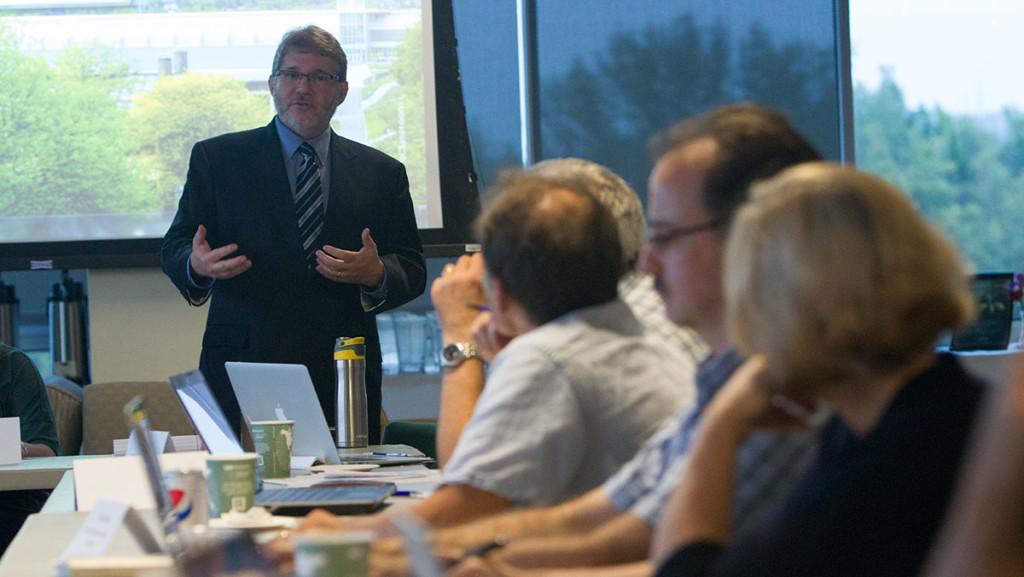Provost Benjamin Rifkin proposed changes, including creating more college-wide consistency and lowering spending in the faculty candidate search process at his first Faculty Council meeting Sept. 1.
Rifkin proposed a $3,000 spending cap for the faculty candidate search process and stressed the need to rein in abuse of spending at dinners for faculty candidates, saying there have been instances in which faculty would take candidates out to dinner and rack up bills upward of $1,000.
“Without guidelines, faculty with very good intentions may not be aware,” Rifkin said. Because of the frequent abuse of allowed expenditures, a revision was made to the search process procedures that allows a $200 dinner budget for candidate dinners.
Members of the council, including David Turkon, associate professor and chair of the Department of Anthropology, expressed their concern over the apparent lack of funds for candidate-related expenses. Diane Gayeski, dean of the Roy H. Park School of Communications, said there is currently no set cap. Turkon said a $3,000 cap would be miniscule in respect to international travel fees.
“People are very upset about this $3,000 cap,” Turkon said, noting other faculty members in the School of Humanities and Sciences were concerned about the “limiting” search budget.
Michael Trotti, professor and chair of the Department of History, was concerned that these budget limitations might give the impression that Ithaca College is “penny-pinching” on the important task of faculty searches.
Peter Rothbart, chair of the Faculty Council and professor in the Department of Music Theory, History and Composition, said spending money to bring in candidates was important.
“There should be enough money to bring in the candidates,” he said. “I can’t imagine we would turn down somebody because we ran out of money.”
John Rosenthal, professor in the Department of Mathematics, said it would be very difficult to bring in international candidates on that budget since Rifkin had earlier in the meeting stressed that search committees should establish a diverse staff. The council collectively suggested that this would be impossible unless the amount per search increased. The council decided to further analyze if more money should be allocated to a search in a future meeting.
After the new search procedures had been discussed, Rifkin agreed to change the language of the procedures to better serve the council’s concerns. Some of the changes Rifkin laid out included changing expenses to focus on lodging and meals; ensuring that if two finalists are invited and one cancels, a second finalist does not need to come in if the first candidate is qualified; and ensuring all candidates received equitable treatment regarding the length of their visit. The council passed the motion to revise the document by the end of the week.
The council also voted unanimously to recommend and support the newly revised Intellectual Property Rights document. The old document left students, faculty and staff vulnerable to copyright and patent violations concerning student work done at the college, Rothbart said. Rothbart said the new document better protects students and faculty in regard to ownership issues and also provides an easily accessible FAQ concerning any copyright and patent violations. However, there was no student input incorporated into the newly revised version.
“I am comfortable that [the Intellectual Property Rights] document is truly protecting students’ rights,” Rothbart said.
Rifkin addressed other ideas to better the college community. He offered a proposal to create an assessment committee that would review college-wide programs like the Integrative Core Curriculum and the campus life sector to ensure campuswide success among students. Rifkin explained that the point of assessing these programs is so that student-success data can be collected and processed and then to address trends.
“The focus is to organize the assessment process,” Rifkin said. “We need a couple years of evidence to demonstrate to outsiders our success.”
Rifkin also proposed to create a committee to discuss equitable workload across campus for faculty. The intent of the committee is to ensure that every faculty member knows what’s expected as an equal workload, which includes other duties such as serving on specific councils or working with students on independent studies.
Another discussion by Rifkin surrounded the lack of consistency between the different schools regarding rules on when students are to be put on probation or dismissed from the college. He wants to convene a committee to work on creating consistent college-wide policies and asked the council for its suggestions.








